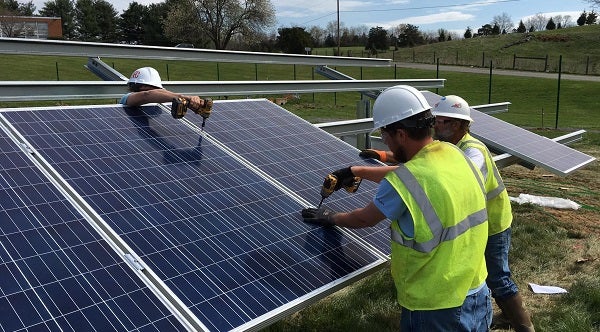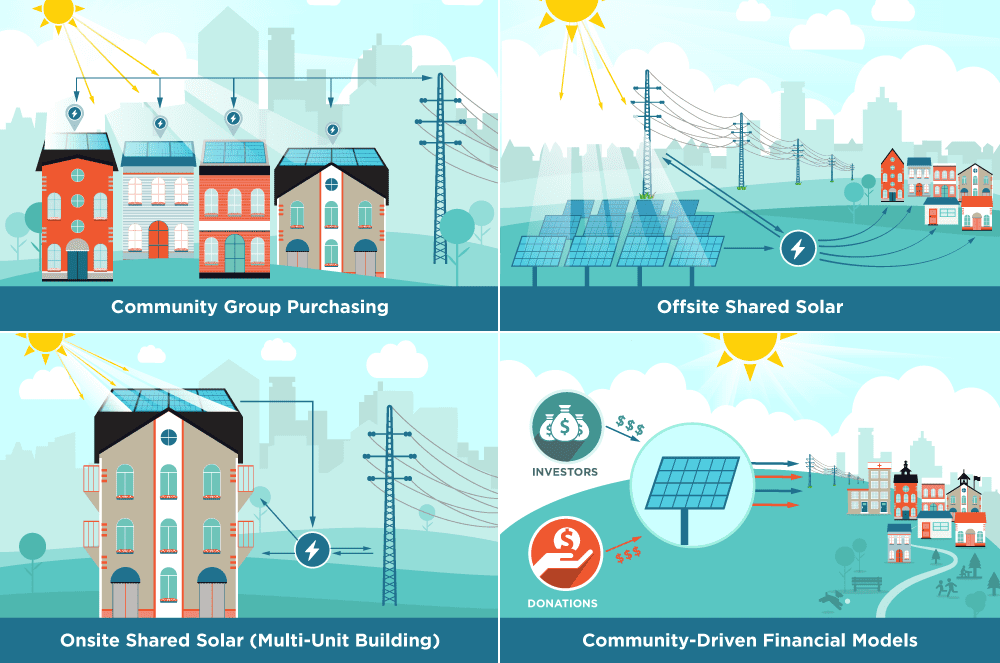Virginia is ready for real community solar


Community solar began with a simple idea. People shouldn’t have to put solar panels on their own roof to benefit from the electricity they generate. Community solar offers the benefit of solar to community members who can’t, or prefer not to, install solar panels on their homes or businesses. This allows everyone to access the benefits of solar energy—even if they live in an apartment building, under a pine tree, or rent their business space.
Community solar projects allow individuals, businesses, or organizations to join together and purchase or lease a “share” in a community solar project in which they receive a proportional benefit from a shared solar installation.
However, not all community solar is created equal. While communities and individuals can utilize a variety of models to meet their needs, real community solar is based on the principles of autonomy, shared public participation, and maximizing benefits for the community of project participants. Real community solar ensures that individuals, towns, churches, and neighbors have the right to develop their own community solar projects. Instead of waiting for utilities to decide, when, where and how a community can develop shared solar projects, real community solar directs decision making, control, and benefits back to the community itself. This vision of shared solar is gaining popularity and has the transformative potential to expand the benefits of solar to a large share of the population currently locked out of the solar market. It is a key step towards building the fair and democratic electricity system that Virginians deserve.
Virginia still lacks real community solar
In Virginia, it is still illegal for community members to develop, own, and participate in real community solar projects. Even worse, it appears as if the term “community solar” is being hijacked by incumbent utilities to describe utility-administered solar subscription programs.
In 2017, Virginia passed a “community solar bill,” (SB 1393) to create pilot programs administered by Virginia’s investor-owned utilities—Dominion Virginia Power and Appalachian Power—that would allow rate-payers interested in subscribing to have some of their electricity generated by solar power. Several Virginia Rural Electric Cooperatives also announced a plan that they call “community solar” last year, but the details told a different story. The plan would add up to a 40% premium for the solar energy used by customers, use output from existing large-scale facilities, and allows for no community development or control. While these plans do marginally expand the availability of solar to more interested utility customers, they should in no way be confused with real community solar.
Virginians deserve better. We deserve to have the ability to develop real community solar that fits the needs of our communities and benefits consumers interested in going solar. The question is, how do we get there?

Building real community solar in Virginia
With the new General Assembly now in session, it’s time to fight for real community solar in the Commonwealth. The first step is to sign the Virginia Declaration of Solar Rights and let your legislators know that you demand real community solar. During the 2018 General Assembly session, we’ll keep you appraised of opportunities to support legislation allowing real community solar. One example is the community solar bill introduced in the Virginia Senate in 2017, SB 1208, that would create a system for Virginia modeled on a successful community solar programs in Colorado. While that bill was ultimately defeated last year thanks to utility lobbying, the shifting tides in Virginia politics might make another attempt worthwhile. We can also look to our neighbors in Maryland and D.C. for inspiration from their successful community solar programs.
As we’ve seen with our recent policy successes, the key is for solar supporters to unite and fight together for common goals. We need to articulate an inclusive vision of community solar that is driven by community members and community groups—including nonprofits and faith-based organizations—to anchor new community solar developments. And we need to keep telling our representatives in Richmond that we demand our solar rights!
Are you with us?
More resources
- Solar United Neighbors: Community solar for community activists: What is community solar? Who owns it? Who benefits?
- Solar United Neighbors: Community Solar Learn the Issues
- U.S. Department of Energy: Community and Shared Solar
- National Renewable Energy Laboratory (NREL): Community Solar Scenario Tool
